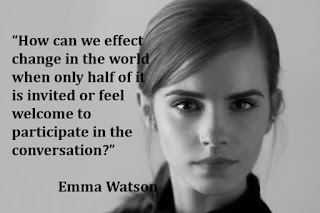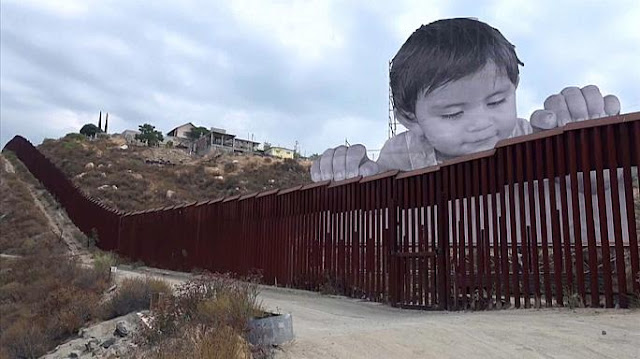Newsflash 1: Harvey Weinstein
Jane Brooks
Power. Privilege. Rape.
It is reprehensible that in 2017, powerful, privileged
white men, such as Harvey Weinstein, are not only tolerated (by reason of their
money and influence), but also accepted and protected by society. In the
process, dehumanizing victims of sexual abuse and further instilling hegemonic patriarchal
systems.
In a recent New York Times article,
Jodi Kantor and Megan Twohey revealed the powerful, domineering, idolized, and co-founder
of Miramax and the Weinstein Company, Harvey Weinstein, is facing dozens of allegations of sexual harassment,
assault, and rape. Although these allegations are just now being publicized and
taken seriously, these cases of harassment date back to the 1970’s and have been
touted as somewhat of a “Hollywood open secret.” The fact that so many in
Hollywood knew about and event witnessed this horrific, criminal behavior, but
did not speak out is unbelievable and deplorable. Not only did his victims not
speak out until recently, but the bystanders who knew or saw Weinstein’s
aggressive mannerisms over the many decades said nothing; nobody held Weinstein
accountable for his criminal behavior. Why is it in 2017 we still have mid 20th
century principles when it comes to abuse and the wall of silence? I believe this
is because society holds powerful, privileged white men to different standards
and rules. Throughout this essay, I expand on my interpretations and
understanding of the sexual harassment allegations against Weinstein exposed in
articles published by The New York Times.
Although in the past couple years, there has
been an increased awareness of the rape culture—particularly in America—sexual
harassment, assault, and rape are still very prevalent. Serial rapist and
sexual harasser, Harvey Weinstein, used his money, power, and reputation to
threaten and control women into doing unwanted sexual acts. This type of
harassment in the workplace still exists all over the world, as exhibited in Enloe’s
article, “Globetrotting Sneaker and Daughters and Generals”, she describes
women in factories who attempt to unionize are often silenced by being raped[1]. Sexual
abuse is often disguised and unrecognizable. Weinstein was able to go
unpunished for his crimes for almost 40 years because Hollywood and big
companies protect and shield predators because it is their best interests
economically. Big name celebrities such as Gwyneth Paltrow, Angelina Jolie, Cara
Delevingne, and many more have recently come forward, stating they too have
been victims of Weinstein’s abuse. If Weinstein is sexually harassing celebrities
and powerful women, it makes me wonder what he has done to less powerful and
more economically dependent women.
For decades, the media has ironically portrayed
Weinstein as nothing but the “ideal uncle”: a person who is generous to
charities, a family man with 5 children, an individual who trumpeted many
liberal causes, and someone whose talent magically made so many Hollywood
careers. As a six-time Best Picture Oscar recipient, a friend and donor to many
Democratic politicians, and even a participant in nationwide women’s marches, Weinstein
could not look better to the public eye. I looked up pictures of Harvey Weinstein
and was instantly met with photos of him surrounded by smiling,
blissful people. In most of these images, the people almost look as if they are
praising him. The truth behind
this false image, however, is unsettling and disturbing. The Times article
by Jodi Kantor and Megan Twohey states that Weinstein had reached at least eight settlements with women,
with more and more coming out each day to tell their stories of abuse. Weinstein
was able to get away with sexual harassment and face no repercussions because
he paid the victims for their silence—to stay invisible. It should come as no surprise
that in this same article, Weinstein made his employers sign NDA’s (contracts
preventing them from speaking out in ways that could harm the businesses
reputation).
Pushing past Weinstein’s repugnant behavior,
is the equally important issue of victim silence. Why do women—friends, spouses,
business colleges, women in power, and so many more—remain silent whilst
knowing about this systematic and oppressive sexual abuse? Weinstein was able
to manipulate these women by providing them with career opportunities, fame,
security, and would then threaten to take these away if the women were not
complacent. I speculate that these women were afraid to speak out
against Weinstein because he was protected by this hegemonic system and had the
power to make others fear him. This
fear is what predators like Weinstein feed on. It is this fear that immobilizes
victims. These hegemonic systems that protect perpetrators like Weinstein are
what contribute to the “wires of a birdcage” as described in Marilyn Frye’s
article, “Oppression”. This never-ending cycle of oppression and sexism traps
women in “cages”. These victims of sexual abuse are birds trapped in a
Weinstein cage, forced to “Mold. Immobilize. Reduce.”, as Fry would say.[2]
These victims also face legal barriers. In
her New York Times article,
Gretchen Carlson discusses her own rape experience and states she has “realized
that the disappointing responses women often face when they go public both
embolden harassers and encourage victims to stay silent.” As well, legal
action can sometimes deter victims from speaking out against their assaulter. Not
only could these women be afraid to speak out due to fear of Weinstein, but
also the fear of not being believed over someone with an enormous amount of privilege
and power. Or even worse, being perceived as having ulterior motives; assaulters
often bend the story to fit their narrative, making the victim feel inferior,
convincing the world—and even the victim at times—that it was their fault.
In this day in age, women are still seen as
sexual objects. Women are shamed if they are sexually active, but are considered
a prude if sexually inactive. Frye discusses this idea in her article; if a
heterosexual woman is either sexually active or inactive it does not matter
because both are going to be proof that the women wanted to be raped.[3] This imbalance of power
between men and women especially in the workforce, leads to the dehumanization
and sexualizing of women’s’ bodies. Too often women inside and outside the
workplace are seen as sexual objects, not as individuals and intellectuals. This
is expressed in Adrienne Rich’s speech, “Claiming an Education”, when she
states, “For our bodies to be treated as objects, our minds are in mortal
danger.”[4]
This powerful quote enlightens readers to the fact that sexual harassment can
take a psychological toll on victims.
I speculate that Donna Karan would state that women’s
bodies are treated as objects because of the way they dress. She expresses
these ideas in a statement made in a New
York Times interview, “It’s not Harvey Weinstein, you look at everything
all over the world today, you know, and how women are dressing and what they’re
asking by just presenting themselves the way they do. What are they asking for?
Trouble.” It is appalling and inconceivable that women such as Karan still
believe in such demoralizing ideals. Karan then goes on to say that Weinstein
did some amazing things, which is true, however, this does not excuse and
pardon him from the fact he has committed criminal acts. Even though Karan does
not condone sexual harassment and assault, by defending Weinstein, she further
supports a system that refuses to punish these deplorable and criminal actions.
So why then did women suddenly start speaking
out against Weinstein just a few days ago? In recent years,
Weinstein has fallen from power and is no longer venerated and etherealized.
This fall from power is one of the reasons which enabled victims of Weinstein’s
abuse to publicly speak out against him and to unite. By speaking out and
holding Weinstein accountable for his actions, these women contribute to the dismantling
of the sexist systems in our society. Sometimes, all it takes is one brave
person to tell the truth, despite the repercussions, and others will soon
follow. In another New York Times article
by Megan Twohey, she describes that Weinstein was fired by his brother, Bob
Weinstein, not after the allegations were publicized, but after half of the
companies all male board members resigned. A sense of hopefulness flooded
through me when I read that these male board members had resigned. Hopefulness
because in resigning, these board members are being active participants in
society.
If
there is a silver lining, it is strength and community of women, and the
support that has been shown to these victims. The next step forward is to
change society’s perspectives on rape and rape culture. Even though in this day
and age it is discussed more, it is still somewhat taboo to talk about rape and
sexual assault or harassment. In order to dismantle these oppressive systems,
we have to change not only society’s perception of women, but also the imbalance
of power between genders and other forms of privilege.
[1] Enloe, Cynthia, Globalization and Militarism: feminists make
the link (Rowman & Littlefield Publishers, March 14, 2007)
[2] Frye,
Marilyn, The Politics of Reality (Trumansburg,
N.Y.,: The Crossing Press, 1983)
[3] Frye,
Marilyn, The Politics of Reality (Trumansburg,
N.Y.,: The Crossing Press, 1983)
Works Cited:
1 1. Enloe, Cynthia, Globalization and Militarism: feminists make the link (Rowman & Littlefield Publishers, March 14, 2007)
2. Frye, Marilyn, The Politics of Reality (Trumansburg, N.Y.,: The Crossing Press, 1983)
3. Rich, Adrienne, Claiming an Education, (The Common Woman, 1977)



Comments
Post a Comment